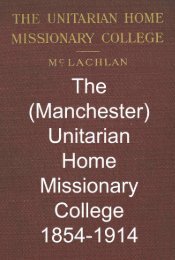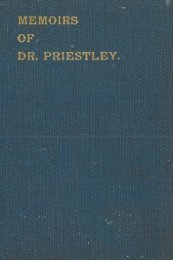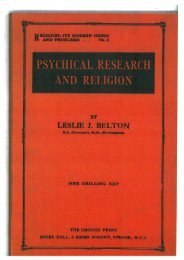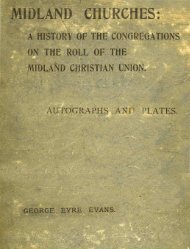Essays in Unitarian Theology by Kenneth Twinn Lindsey - General ...
Essays in Unitarian Theology by Kenneth Twinn Lindsey - General ...
Essays in Unitarian Theology by Kenneth Twinn Lindsey - General ...
Create successful ePaper yourself
Turn your PDF publications into a flip-book with our unique Google optimized e-Paper software.
1 , ;<br />
,<br />
~ j i i<br />
l<br />
#'!I<br />
i;<br />
: 'i<br />
, ,<br />
! h ! j<br />
i 1 j j<br />
I I<br />
! . . I<br />
' i ; ;<br />
1 I!;<br />
1iI:<br />
: ! , l<br />
! l / /<br />
/ j/<br />
( I \ j<br />
l l !,<br />
' : l 1<br />
' I<br />
;!i~<br />
ESSAYS IN UNITARIAN THEOLOGY<br />
is the Christian church, which has ma<strong>in</strong>ta<strong>in</strong>ed through<br />
the centuries someth<strong>in</strong>g of the revelation of Jesus,<br />
although it has also perverted it and has exalted him<br />
to a deity which I cannot accept. Nevertheless I<br />
belong to that church too, because I have been born<br />
and bred <strong>in</strong> Christendom. I can, however, give my<br />
full allegiance only to that organization which calls<br />
itself <strong>Unitarian</strong>, because it offers me the freedom <strong>in</strong><br />
religious thought and life without which religion is for<br />
me a sham, and yet is committed to the pursuit of<br />
truth, goodness and beauty with all the discipl<strong>in</strong>e<br />
without which that pursuit is <strong>in</strong>effective, feeble and<br />
va<strong>in</strong>. It is far from perfect, but its well-be<strong>in</strong>g depends<br />
upon me <strong>in</strong> company with all others who prize its<br />
aims and functions; these I prize so far as have<br />
jo<strong>in</strong>ed its m<strong>in</strong>istry, but had I not taken that step, I<br />
should be called upon to support it as a whole and <strong>in</strong><br />
whatever congregation there might be <strong>in</strong> the locality <strong>in</strong><br />
which I might live.<br />
Conclusion<br />
This is, <strong>in</strong> brief, what religion means to me. A. N.<br />
Whitehead has summed it up <strong>in</strong> words which express<br />
the depth and vastness of what is man's supreme<br />
<strong>in</strong>heritance :<br />
Religion is the vision of someth<strong>in</strong>g which stands be-<br />
yond, beh<strong>in</strong>d and with<strong>in</strong> the pass<strong>in</strong>g flux of immediate<br />
th<strong>in</strong>gs; someth<strong>in</strong>g which is real and yet wait<strong>in</strong>g to be<br />
realized; someth<strong>in</strong>g which is a remote possibility and yet<br />
the greatest of present facts; someth<strong>in</strong>g that gives mean<strong>in</strong>g<br />
to all that passes and yet eludes apprehension; someth<strong>in</strong>g<br />
whose possession is the f<strong>in</strong>al good and yet is beyond all<br />
reach; someth<strong>in</strong>g which is the ultimate ideal and the hope-<br />
less quest.<br />
BELIEF IN GOD<br />
<strong>by</strong> Arthur J. Long<br />
" THERE can be no surer sign of decrepitude and decay<br />
<strong>in</strong> faith than a prevalent nervousness about nam<strong>in</strong>g and<br />
cornmend<strong>in</strong>g reason, an unwill<strong>in</strong>gness to allude to its<br />
existence, except under wrapp<strong>in</strong>gs of language which<br />
suggest that it is but a necessary evil.'.' Such was the<br />
op<strong>in</strong>ion of an em<strong>in</strong>ent n<strong>in</strong>eteenth-century scholar. *<br />
If he was right, then it is obvious that contemporary<br />
faith is <strong>in</strong> an advanced state of decay. Nowadays<br />
there is no God but unreason, and Kierkegaard is his<br />
prophet. From the strange, tortured speculations of<br />
this n<strong>in</strong>eteenth-century " gloomy Dane " we have, on<br />
the one hand, the open irrationalism of the <strong>Theology</strong><br />
of Crisis (" The object of faith is someth<strong>in</strong>g which is<br />
absurd to reason. . . . The hall-mark of logical <strong>in</strong>consistency<br />
cl<strong>in</strong>gs to all genu<strong>in</strong>e pronouncements of<br />
faith ") ,t and on the other, the paradoxes and obscurities<br />
of Existentialism. On all sides we see the stra<strong>in</strong><br />
to base religious faith on someth<strong>in</strong>g other than rational<br />
argument,. <strong>in</strong> a pathetic attempt to evade the assaults<br />
of non- theis tic philosophers.<br />
-<br />
There is, of course, noth<strong>in</strong>g new <strong>in</strong> the repudiation<br />
of reason <strong>in</strong> religion. In a sense, it goes back to the<br />
Reformation.<br />
* F. J. A. Hort: The Way, the Truth, the Life, p. 176.<br />
t E. Brunner : Philosophy of Religion, p. 55..






